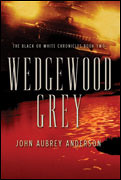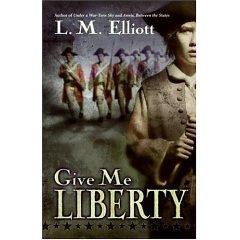Anderson: "I was born and raised in my grandparents’ home, five miles north of the setting I chose for Abiding Darkness. That little cotton country town is within a rifle shot of two rivers, a bayou, a double handful of lakes, and endless acres of woods. Add that backdrop to a culture that offered an umbrella of protection for children while allowing boys to roam the countryside with firearms and fishing poles..."
 "Wedgewood Grey, The Black or White Chronicles Book Two," Exciting new Christian thriller by John Aubrey Anderson. 2007.FaithWords
"Wedgewood Grey, The Black or White Chronicles Book Two," Exciting new Christian thriller by John Aubrey Anderson. 2007.FaithWordsOne bleak night, in the middle of a wet April in a 1960s Mississippi community, evil is aroused. In the dark stillness of midnight, an innocent black woman is attacked by a mob of white men. Mose confronts the men from behind his twelve-gauge shotgun, and people die.
In 1962, an old black man and his grandson move into the country near Pilot Hill, Texas. He and the 10-year-old boy are fugitives, running from the certain injustice they know they'd receive from a justice system that will hold them liable for killing two white teenage boys determined to kill them. And, Mose and his grandson are fleeing something else, something more terrifying.
Missy Parker Patterson, who as a child stood at the epicenter of the first demonic war at Cat Lake, returns in the aftermath that follows Mose Washington’s disappearance to discover that the demonic beings have been anticipating her return . . . and so begins the second battle of The War At Cat Lake.
Wedgewood Grey is a story about the impact our choices make in our lives and the lives of those around us, when we choose between good and evil--choices that real people are sometimes forced to make.
Anderson's novels, "Abiding Darkness" and "Wedgewood Grey," are receiving good reviews. I'm currently reading "Wedgewood Grey" and find that I can't put it down. It's fast paced and filled with characters I've quickly learned to care about, and some I hope never to meet.
You can read the first chapter of the novel that begins this supernatural thriller series, "Abiding Darkness," at FIRST
Read more reviews from CFBA's Reviewer List and at Infuzemag
"Wedgewood Grey," Anderson,Amazon.com ISBN: 0446579505
